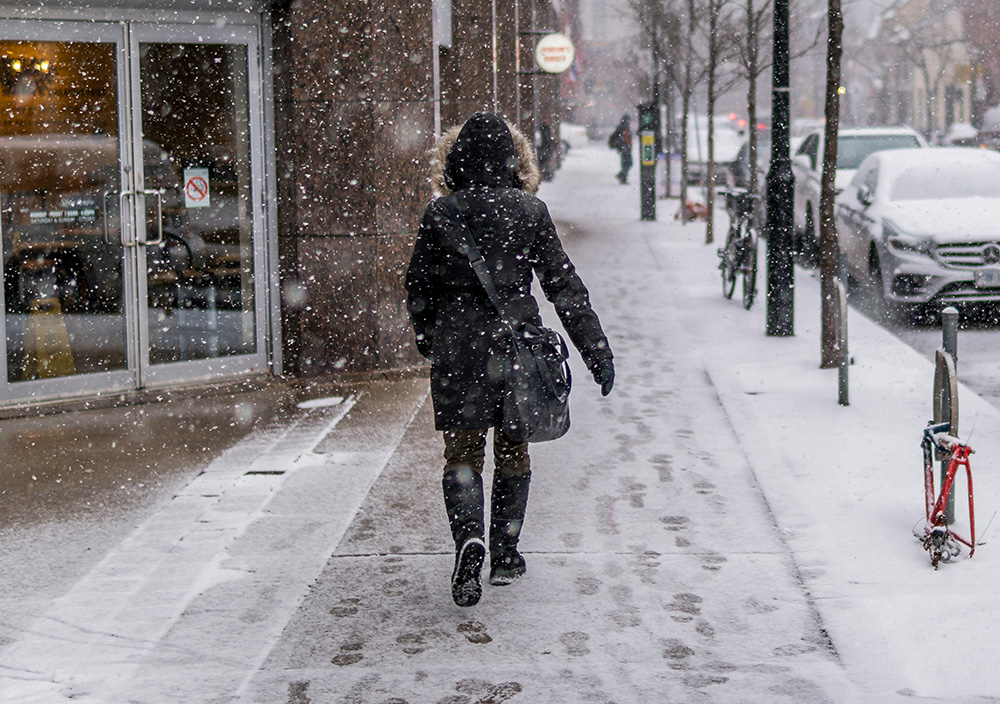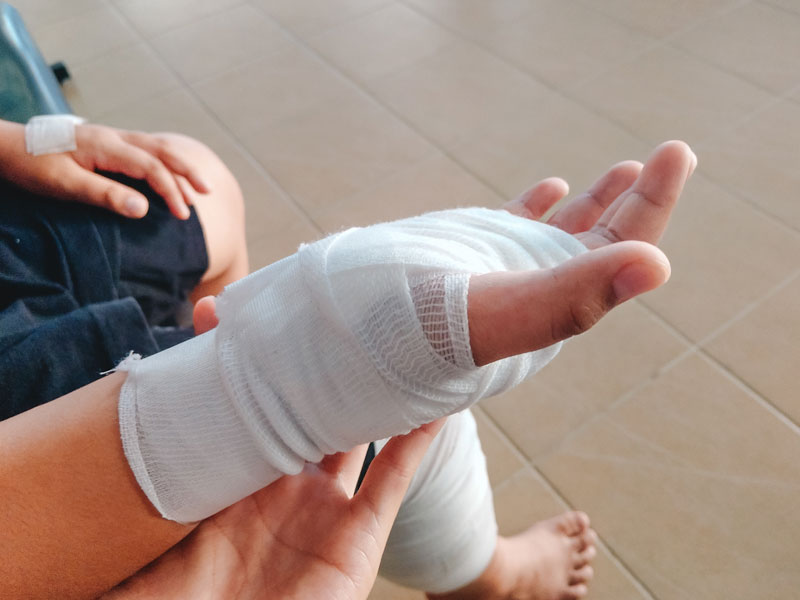
Winter weather conditions can sometimes make for a scary driving experience. Snow, ice, or slush might create slippery road surfaces, which can cause a driver to lose control of their vehicle and crash.
Icy roads can also complicate motor vehicle accident claims. If a driver collides with your vehicle on a slick road, they may argue that they are not liable for your injuries because the dangerous road conditions made the crash impossible to avoid. The condition of the road can also be a factor in determining whether a driver was at fault in an accident, and hence, whether insurance will pay for all damages caused in a crash.
The attorneys at Anderson Trial Lawyers are skilled in handling motor vehicle accident claims of all kinds, including motor vehicle accidents that occur in winter weather. Here are a few factors that commonly come up in these types of claims.
Negligent driver behavior
When you get behind the wheel, you owe a duty of care to drive responsibly — not only for your own safety but for the safety of everyone else on the road. When hazardous conditions are present, this means you must reduce your speed and otherwise use extra caution to reduce the chances of an accident.
For this reason, motor vehicle accident claims primarily focus on the behavior of each driver rather than the road conditions at the time of a crash. Drivers are expected to be aware of any hazards the weather might create — many vehicles even issue a warning that ice might be present when they are started on days with freezing temperatures — and respond accordingly.
If you are involved in an accident with another driver who was not exercising due caution at the time of the crash, they can be held liable for your injuries. Some examples of negligent behavior include:
- Driving too fast for conditions: During hazardous conditions, drivers are expected to slow down to travel at a safe speed — even if their vehicle is equipped with four-wheel drive, snow tires, or other features to help them navigate winter weather. Drivers who travel too fast for conditions may not be able to safely stop on a slippery road.
- Following too closely: Drivers must always maintain a safe following distance from the vehicle in front of them so they can stop, if necessary. During slippery conditions, drivers are expected to increase this following distance to account for reduced traction.
- Inadequate maintenance: A driver’s duty of care includes keeping their vehicle in safe working condition. Certain maintenance issues, such as tires and brakes, will make it more difficult for a driver to operate their vehicle and avoid a crash in icy conditions.
- Failing to take other precautions: A driver might be held liable if they do not take other proper precautions in poor weather conditions, such as using their headlights during low visibility conditions and clearing their windshield of snow and ice.
Factors that limit a driver’s liability
In some cases, a court may decide that a crash resulted from the inherent risks of driving in hazardous weather during the winter, not negligence on a driver’s part. Even if a driver is found to be negligent in a crash, certain factors can limit their liability. These include:
- Unpredictable hazards: If a driver encounters something unusual on a road with little or no warning, they may be able to argue that they did not have adequate time to respond to the hazard.
- Reasonable driving behaviors: A driver may be able to show that the accident occurred even though they were taking the necessary precautions, such as reducing their speed.
- Uncontrollable sliding: Some circumstances, such as a severe ice buildup and sloped roads, can cause vehicles to slide uncontrollably. This can be considered a mitigating factor that reduces a driver’s liability in a crash.
Third-party liability
On public roadways, it is the duty of the state or municipal government to keep the road reasonably clear of snow and ice in order to permit safe travel. They are also responsible for the upkeep of features that can improve road safety and reduce accident severity, such as streetlights and barriers that separate the road from a steep slope.
Governments typically have immunity protections against certain lawsuits, on the principle that excessive litigation could impede the government’s ability to provide services. However, municipal or state governments can still be held liable if they fail to properly maintain a road.
For example, you might show that a town’s public works department failed to sand and salt the road despite adequate warning of potential icing, or that they did not respond to icy conditions in a timely manner. You can also argue that inadequate maintenance of safety features contributed to a more severe accident.
If the crash occurred on a private road, you may be able to file a claim against the entity responsible for maintaining the road. Certain other factors will also affect liability for motor vehicle accidents on private roads, such as contractual agreements between a homeowners association and the party responsible for the upkeep of the road.
Let’s review your case
If you or a loved one have been injured in a motor vehicle accident, the skilled attorneys at Anderson Trial Lawyers can help. We’ll review the circumstances of your accident and help you get the settlement or verdict you deserve. Contact us online or call us at 860.886.8845 to set up a free consultation.

Most of us have had the unpleasant experience of taking a tumble during the winter. Snow and ice create more slippery surfaces, making it more likely that you’ll lose your footing.
Slipping and falling is so common in wintertime that people may consider it a normal part of the season. Yet these incidents can also lead to serious injuries, such as broken bones or traumatic brain injuries, that result in lost wages and expensive medical bills.
Even though falls occur frequently in the winter, you’ll still have grounds for a personal injury claim if another person’s negligence contributed to your accident. However, numerous factors also go into determining liability in a winter slip and fall case, including the property owner’s responsibilities, the injured person’s actions, and the inherent risks of winter weather.
When you have grounds for a personal injury claim
The property owner failed to remove ice and snow
Property owners have a duty of care to keep the premises reasonably safe for visitors. During the winter, that means inspecting areas such as walkways, driveways, and parking lots for snow and ice, and then taking steps to remove it. Although public sidewalks are considered municipal property, local ordinances and statutes typically put the responsibility for snow and ice removal on the abutting property owner. Commercial property owners also have a duty to anticipate inclement weather and prepare accordingly, in addition to maintaining the property after a weather event.
The property owner negligently maintained their property
If a property owner does not maintain their property well, it can lead to hazards such as leaking roofs, improperly draining gutters, or poor drainage. These conditions can cause water to pool and freeze in areas where visitors might walk, increasing the risk of a slip and fall accident. Property owners can also directly create hazards through negligent behavior, such as emptying water onto a nearby sidewalk and allowing it to freeze.
The property owner failed to warn you about the hazard
A property owner can — and should — put up signs or barriers warning people about slippery conditions they know to exist. If the property owner does not take this step, they can be held liable if someone is injured on the property.
When you might not have a claim
The property owner wasn’t negligent
Property owners are not expected to remove every last speck of snow and ice from their property, only to make a reasonable effort to address the hazard. A court may determine that the property owner did their due diligence but that inherently dangerous conditions still remained.
Similarly, property owners are not expected to clear snow and ice as soon as it appears; rather they must address the hazard within a reasonable amount of time. If you slipped and fell while walking during a winter storm, for example, a property owner can’t be held liable because they aren’t expected to clear their property until after this weather has subsided (this is known as the “ongoing storm doctrine”).
Property owners can also sometimes limit, or even eliminate, their liability if they demonstrate that they quickly addressed a hazard once it was reported to them.
You share the blame for your injury
Comparative negligence is an affirmative defense that typically acknowledges that the defendant bears some responsibility for the plaintiff’s injuries, but also argues that the plaintiff is partially to blame due to their own negligent actions. For example, the defendant in a winter slip and fall case might argue that the plaintiff was wearing improper footwear or failed to see the hazard because they were distracted at the time.
If the court determines that you were primarily responsible for your injury (at least 51 percent to blame), you won’t be able to recover damages. If the defendant was primarily to blame, you’ll still be able to file a claim but comparative negligence will reduce the damages you’ll be able to recover.
You slipped and fell on public property
Government entities generally have greater protection against lawsuits. This will limit your ability to file a claim if you slipped and fell at a location such as a government building, public park, or a sidewalk maintained by a municipality.
However, it is still possible to file a claim against a government entity if you follow certain procedures and abide by timelines, and if you can make the case that the government was negligent in its duty of care.
Let’s review your case
If you have been injured in a winter slip and fall accident, the experienced attorneys at Anderson Trial Lawyers can help you with your personal injury claim. Contact us online or call us at 860.886.8845.

You may be reluctant to bring a personal injury claim, but not because you’re worried that you won’t prevail at trial or get treated fairly under the law. Instead, you may be worried that people will think your claim is frivolous.
“Frivolous lawsuit” is a term created by politicians and insurance companies to call into question the entire concept of seeking fair and reasonable compensation for real injuries caused by the negligence of another. There have been many personal injury claims filed over unusual incidents. This doesn’t mean those claims are frivolous. With more people on this planet, more cars on the road, and more products being advertised to us in a commercial world, honest people are being harmed and deserve to have their claims determined on the merits of their case.
Even if a personal injury claim seems strange, that doesn’t necessarily mean that it is without merit. Perhaps the most famous example is the McDonald’s hot coffee case of 1994, in which an elderly woman named Stella Liebeck sued the fast food chain after spilling coffee on herself. Many people still believe that this case involved a greedy plaintiff who suffered a minor burn from carelessly handling a hot beverage, then exploited the injury to seek a huge settlement from a wealthy corporation.
The truth is much more complicated. Liebeck suffered third-degree burns over 16 percent of her body and was hospitalized for eight days. She only sued McDonald’s after the company repeatedly refused her requests to cover her medical bills. The trial also exposed how McDonald’s had been keeping its coffee dangerously hot (against industry safety standards) to maximize the number of cups of coffee it could get out of one pot, and hadn’t changed this practice even after the company became aware of hundreds of prior burn injuries. In other words, the trial brought out the greed of a fast food giant in the face of many people being injured by their product.
In the end, Liebeck asked the jury to send a message to McDonald’s. Liebeck prevailed in her claim, and McDonald’s was ordered to pay compensatory damages for her pain, suffering, and medical bills, as well as punitive damages.
The award was equal to one day’s coffee receipts for McDonald’s worldwide, which is why the number was so high. And this is what the insurance industry, politicians in the pockets of big business, and others that want to limit injured people’s rights access to the courts used to indoctrinate the general public — those that will eventually sit on juries. In actuality, the trial court reduced Liebeck’s award substantially under state law. The general public rarely heard about that, however.
Even if you’re worried that your personal injury claim may cause you embarrassment, this shouldn’t dissuade you from consulting with an attorney on the matter. If you have a legitimate personal injury claim and choose not to pursue it, you won’t be able to collect any damages from the negligent party — and you may be on the hook for any medical bills and other expenses.
Frivolous personal injury claims vs. illegitimate personal injury claims
Very few personal injury claims are actually considered frivolous. That’s because a frivolous claim is one the court determines to be a deliberate bad faith effort to harass a defendant. Frivolous lawsuits may attempt to tarnish a defendant’s reputation, cause embarrassment to a defendant, or bring media attention to an issue.
Courts consider personal injury claims to be frivolous if they are filed on grounds that are so flimsy that a reasonable person wouldn’t believe that the facts support the plaintiff’s case. A court may also consider a claim to be frivolous if it is not supported by existing laws, although the plaintiff may argue that they believe there is a good faith argument for their case to establish a new legal precedent.
In general, attorneys will never try to take a frivolous claim before a court. Here’s why:
- Bad reputation: Frivolous lawsuits cause stress and economic losses for the defendants and waste the court’s time. Attorneys don’t want to be responsible for this type of detrimental impact, or receive a poor reputation due to such claims.
- Wasted effort: Summary judgment decisions quickly dismiss frivolous claims so they stop taking up the court’s time. Attorneys are unlikely to spend time and effort preparing a claim if it’s destined to be quickly thrown out.
- Penalties: Attorneys filing frivolous cases can be fined, sued or even disbarred.
Many of the lawsuits that are held up as examples of frivolous claims are actually legitimate claims. They are advertised as frivolous even though a jury of honest people found the claim legitimate.
Is my claim legitimate?
A personal injury claim is legitimate if you have suffered an injury and can show, by a preponderance of the evidence, that this is due to a violation of law, policy or code, or the action—or lack of action—by the defendant. The strongest claims will clearly demonstrate that the defendant violated a long-standing rule and how the plaintiff has been affected (such as financial losses or the inability to continue enjoying certain activities).
In some cases, the evidence is clearly on the plaintiff’s side and a settlement can be reached quickly. However, most claims involve more complicated circumstances. The defendant may argue that they were not responsible for the plaintiff’s injuries, or that the plaintiff was partially if not completely responsible for their own injuries.
A defendant may also try to frame a plaintiff’s case as frivolous, and just this accusation can bias a jury against the plaintiff. A skilled attorney can push back against this argument and show how your personal injury claim has merit.
If you have any concerns over the legitimacy of your personal injury claim, consultation with an experienced attorney is a good place to start. This meeting is a chance to discuss your claim, what evidence you have to support it, and whether it is likely to succeed in court. To schedule a free consultation with Anderson Trial Lawyers, call 860-886-8845 or contact us online.

Some people consider motorcyclists to be reckless, irresponsible, and dangerous. This bias can affect the people who witness the accident, the first responders who treat the injured motorists, the judge and jury hearing a claim, and the insurance adjusters determining the value of a claim.
It’s important to understand these biases when filing a claim in a motorcycle accident. An experienced personal injury lawyer will work to push back against “motorcycle bias” and get you the settlement or verdict you deserve.
Examples of motorcycle bias
People can be biased against motorcyclists because they believe:
- Motorcycles are too difficult to see on the road
- Motorcycles are too fast or loud
- Motorcyclists are risk-takers
- Motorcycling is a risky behavior and motorcyclists knowingly assume the risks of the road
- Motorcyclists are irresponsible young men prone to dangerous behavior
Any of these biases can make a person more likely to believe that a motorcyclist is at fault in an accident.
Insurance company biases against motorcyclists
above but also because statistics seem to indicate that motorcyclists are more dangerous motorists. For example, motorcyclists are associated with a higher rate of fatal motor vehicle accidents. While this is a result of their more limited protections and smaller size, insurers may believe that it’s due to reckless riding.
Insurers may also believe that motorcyclists’ injuries are a result of poor decisions, such as choosing not to wear a helmet. Connecticut does not require a motorcyclist to wear a helmet. In fact, about two-thirds of motorcyclists wear a helmet and injuries are more common because motorcyclists are more exposed in collisions with motor vehicles.
Bias from insurance companies can lead to a denial of claims or a reduction in value. This, in turn, can leave a motorcyclist struggling to pay their medical bills and other expenses after an accident, and little to nothing for the way their injuries affect their day to day life.
When filing a motorcycle accident claim, we make the argument that the greater risks associated with motorcycles don’t mean that motorcyclists are inherently riskier drivers. A person riding a motorcycle responsibly still presents far less risk to themselves and others on the road than a person driving a motor vehicle irresponsibly.
Overcoming motorcycle bias
When filing a claim related to a motorcycle accident, the attorneys at Anderson Trial Lawyers work to address and overcome any potential biases that may affect the case. This strategy helps ensure that the claim gets fair consideration.
The use of accident reconstruction experts can build a convincing set of arguments supported by evidence, such as photographs, diagrams, videos, skid mark measurements, and analyses of vehicle damage to combat assumptions that the motorcyclist was driving recklessly.
We also confront these biases during jury selection to minimize the effects of bias when the claim is settled or goes to trial. By making jurors aware of motorcycle bias, we help ensure that they aren’t unconsciously affected by it.
Witness testimony is particularly valuable. Statements from friends and family can separate you from negative stereotypes and emphasize that you are a safe, law-abiding motorcyclist.
Injured in a motorcycle accident?
If you or a loved one have been injured in a motorcycle accident, contact the attorneys at Anderson Trial Lawyers for a free consultation.
Call us at 860-886-8845 or contact us online.







